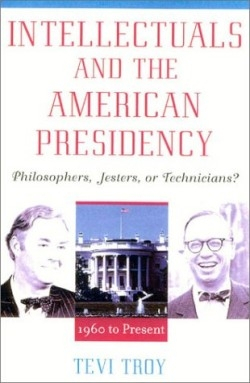Intellectuals and the American Presidency
Philosophers, Jesters, or Technicians?
“If presidents are the lions of American politics, intellectuals are the mice, [who] have the potential to remove—or insert—the thorn in the lion’s paw,” opines the author in this insightful and unique investigation of the roles intellectuals played in presidential administrations. Troy, an official at the Department of Labor, presents thought-provoking essays, tinged with humor, on how presidents use sometimes arrogant, usually well-meaning intellectuals—liberal and conservative—who are eager to offer their views.
Arthur Shlesinger, who served as President Kennedy’s
“thinker without portfolio,” was the model for future White House intellectuals, says Troy. He helped Kennedy define his “Last Frontier” vision and promoted the Camelot and JFK legend after the president’s assassination. Lyndon Johnson’s relations with the intellectual community and with Eric Goldman, his court intellectual, were frosty. Goldman failed at both important responsibilities of the intellectual: clarifying the president’s vision and serving as a liaison to the intellectual community. Reduced to writing fluff pieces for Lady Bird Johnson and the Johnson daughters, Goldman took his revenge by writing his scathing bestseller, The Tragedy of Lyndon Johnson, shortly after he resigned.
Daniel Patrick Moynihan shared with his boss, President Richard Nixon, contempt for the left-wing intellectuals who populated the universities during the 1970s, even though Moynihan himself was a Democrat. He was responsible for leading many disaffected liberal intellectuals into the new neo-conservative camp.
To find like-minded intellectuals, Democratic presidents turned to universities, institutions where conservatives were not welcomed. Conservative think tanks as the source of intellectuals, like the Hoover and American Enterprise institutes, did not exist before the Reagan administration. Reagan made good use of such intellectuals as Martin Anderson of Hoover, who made sure that advisors remained faithful to the president and his conservative agenda.
President Clinton was more successful in using intellectuals than any president since Kennedy. Unfortunately, they were used more as a buffer from his enemies than as promoters of his “New Democrat” vision. George W. Bush, like his father and Jimmy Carter, demonstrates little interest in reaching out to the intellectual community.
Presidents, Troy concludes, need to use intellectuals because of the growth of government and the expansion of the media, which requires continual explanations and refinements of presidential programs. The subtitle of this book was taken from a question asked of Eric Goldman by legendary journalist Theodore White: “Are court intellectuals philosophers, jesters, or technicians?” Troy’s lucid appraisal shows that the answer is a little bit of each.
Disclosure: This article is not an endorsement, but a review. The publisher of this book provided free copies of the book to have their book reviewed by a professional reviewer. No fee was paid by the publisher for this review. Foreword Reviews only recommends books that we love. Foreword Magazine, Inc. is disclosing this in accordance with the Federal Trade Commission’s 16 CFR, Part 255.

